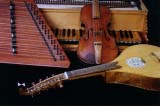Classical Era: Influential Events, Institutions, and People
During the Classical era, music was not being written specifically for the church as much as in previous eras. Vienna, the capital of Austria, was the musical center of Europe. Music from this era is often called the Viennese style. Vienna was the center for musical training, and musicians and composers traveled from across Europe to study there. As a result, the composers created and developed the standard musical forms and genres that are still prevalent today, such as concerto form, opera, sonata form, and the symphony.
Well-known Classical Era composers that emerged from the Viennese school are Franz Joseph Haydn, Wolfgang Amadeus Mozart, and Ludwig van Beethoven. They helped the growth and development of the orchestra and the orchestral symphony. Sonatas and string quartets were other new creations from this school. During this time period, the general public had more leisure time, which meant that they could choose music as a hobby or attend concerts in their free time. This affected the patronage system, where musicians and composers wrote music either strictly for the Church or for their Royal or wealthy patrons.
With the emergence of this new audience, composers could make more choices in what they composed and who they composed music for. For the first time, composers had more freedom, and public concerts took form.
